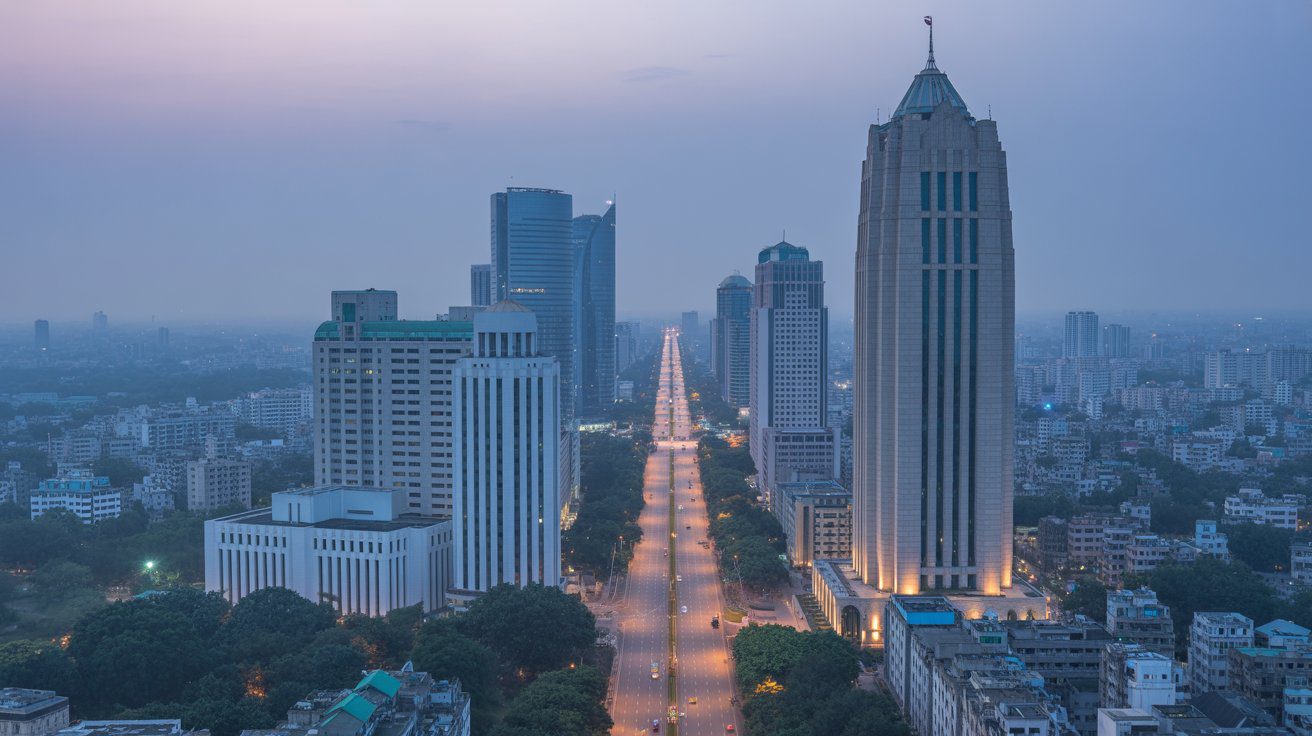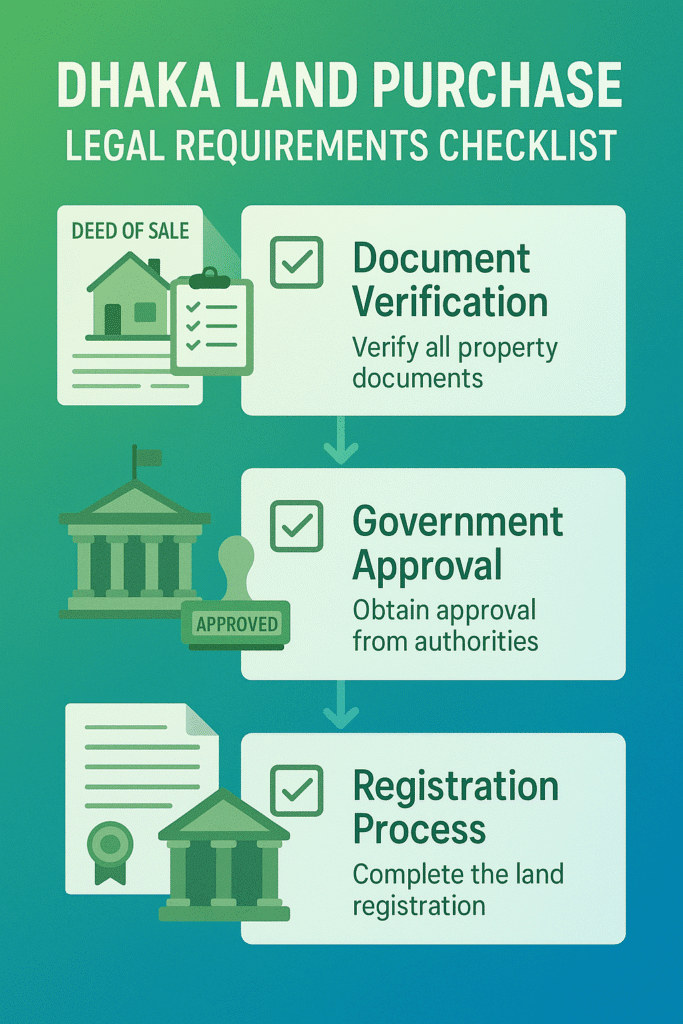Address
26/B, Luxury D Zakia Tower, Dhaka 1217
Phone: (+880) 01765777023
How to Buy Land in Dhaka: Complete Guide for Safe Property Investment

Buying land in Dhaka requires navigating complex legal frameworks, conducting thorough due diligence, and understanding market dynamics to ensure a secure investment. This comprehensive guide provides step-by-step instructions for purchasing property in Bangladesh’s capital city, covering legal requirements, financial considerations, and strategic location analysis.
What Legal Requirements Must You Meet When Buying Land in Dhaka?
Land ownership in Bangladesh is governed by the Registration Act of 1908 and the Transfer of Property Act of 1882. The legal framework requires verification through a chain of title deeds, mutation records, and tax receipts to establish clear ownership.
Key Legal Foundations
The State Acquisition and Tenancy Act of 1950 distinguishes between different types of land ownership, including freehold ownership where owners have absolute rights, and leasehold ownership for government or private entity leases. Property transactions must comply with title verification requirements, land survey record checks, and legally binding deed preparation.
Role of Government Authorities
The Assistant Commissioner (Land) office oversees mutation approvals and resolves disputes, making verification of mutation proposals essential. For properties in planned areas like Uttara or Purbachal, RAJUK (Rajdhani Unnayan Kartripakkha) approval ensures compliance with zoning regulations and development standards.
How Do You Conduct Proper Due Diligence for Land Purchase?
Due diligence involves three critical phases: document verification, physical inspection, and legal compliance checks.
Phase 1: Document Verification
Title deed verification requires confirming the deed is registered and stamped, while cross-checking with previous deeds validates the ownership chain. Tax clearance verification ensures all land development taxes are paid to avoid legal complications. Survey records including CS, SA, RS, and BS/DP documents help confirm boundaries and prevent encroachment issues.
Phase 2: Physical Inspection
Physical verification involves hiring a licensed surveyor to demarcate land using GPS and historical maps3. Local inquiries with neighbors and mouza officials can uncover unregistered disputes or claims that may not appear in official records3.
Phase 3: Legal Compliance
For inherited properties, valid heir certificates from courts are mandatory. Commercial plots near wetlands, lakes, or rivers require Department of Environment approvals. Properties must be verified as free from litigation, mortgages, or government acquisition plans.

What Are the Current Land Prices in Different Areas of Dhaka?
Land prices in Dhaka vary significantly by location, with prime areas commanding premium rates.
Prime Area Pricing
Gulshan and Banani represent the most expensive locations, with land prices ranging from BDT 10-25 crore per katha. Dhanmondi, a popular residential area, sees land prices between BDT 1.2 to 1.8 crore per katha due to excellent schools, hospitals, and shopping centers.
Emerging Area Opportunities
Uttara offers more affordable options with land prices ranging from BDT 70 lakh to 1.2 crore per katha, benefiting from proximity to Hazrat Shahjalal International Airport and ongoing metro rail projects. Bashundhara Residential Area has become a hotspot with prices ranging from BDT 80 lakh to 1.5 crore per katha due to well-planned infrastructure.
Budget-Friendly Options
Mirpur provides more affordable land compared to central Dhaka, with prices ranging from BDT 50 lakh to 90 lakh per katha. Purbachal and suburban zones offer opportunities in the BDT 1-5 crore per katha range.
Which Areas Offer the Best Investment Opportunities?
Strategic location analysis reveals several high-ROI areas with strong growth potential.
Government-Backed Developments
Purbachal represents a government-backed township with 100-foot roads and planned metro rail connectivity, with land prices rising 22% in recent years. These planned developments offer infrastructure advantages and regulatory certainty.
Infrastructure-Driven Growth
Areas near major infrastructure projects show strong appreciation potential. Keraniganj offers affordable riverside plots with future Padma Bridge access, creating long-term value opportunities. Proximity to transportation hubs, universities, and hospitals drives sustained demand.
What Documents Do You Need for Land Registration?
Essential documents for land registration include comprehensive ownership and legal verification papers.
Primary Documents
Title deed establishing proof of ownership, Khatiyan records of rights, and mutation certificates confirming ownership transfer in government records are fundamental requirements. Current land development tax receipts demonstrate tax compliance.
Additional Required Papers
All previous deeds from the past 30 years establish ownership chains, while succession certificates are needed for inherited properties. Seller identification documents, tax clearance certificates, and approved building plans (where applicable) complete the documentation package.
Survey and Approval Documents
CS, SA, RS, and latest survey documents like BS Jarip confirm boundaries and legal status. RAJUK or relevant authority approvals are mandatory for properties in planned areas.
How Long Does the Land Buying Process Take?
The land buying process typically requires 60-90 days, depending on document verification complexity and mutation approval procedures.
Registration Timeline
Property registration itself takes 1-2 days for document submission and verification at the Sub-Registry Office4. However, obtaining the original registered deed may take a year or more due to administrative processing.
Factors Affecting Timeline
Document completeness significantly impacts processing speed, while properties with complex ownership histories or pending legal issues require additional time. Areas requiring RAJUK or environmental approvals may extend the timeline further.
Can Foreigners Buy Land in Dhaka?
Foreign land ownership in Bangladesh involves specific restrictions and approval processes.
Legal Framework for Foreigners
Foreigners cannot purchase land directly but can own property through local companies or inherit land if married to Bangladeshi citizens. Agricultural land purchases are strictly prohibited for foreign nationals.
Approval Requirements
Foreign investors need approval from the Ministry of Home Affairs and Board of Investment (BOI) before purchasing residential or commercial properties. The Bangladesh Investment Development Authority (BIDA) provides guidelines for commercial plot approvals.
Alternative Options
Non-Resident Bangladeshis (NRBs) have the same rights as local citizens provided they can demonstrate Bangladeshi citizenship proof. Dual nationals must provide Bengali citizenship documentation for land purchases.
What Are the Common Risks to Avoid?
Several critical risks can jeopardize land investments in Dhaka.
Environmental and Geographic Risks
Flood-prone zones like Demra and Shyampur present significant risks due to Dhaka’s deltaic location. Construction on weak soils, particularly in eastern and western Dhaka areas developed through wetland filling, increases earthquake vulnerability.
Legal and Regulatory Risks
Unauthorized developments without RAJUK’s Detailed Area Plan approval create legal complications. Properties involved in litigation or lacking proper mutation records should be avoided entirely.
Market and Investment Risks
Overpaying for land in premium locations without proper revenue forecasting can impact investment returns. Properties with unclear ownership chains or pending disputes present significant financial risks.
Ready to Invest in Dhaka Land?
Have questions about specific areas or need help with due diligence? Contact our property experts for personalized guidance on your land investment journey.
Key Takeaways for Dhaka Land Investment
- Legal Requirements: Verify title deeds, mutation records, and obtain RAJUK approvals for planned areas
- Due Diligence: Conduct three-phase verification including documents, physical inspection, and legal compliance
- Prime Locations: Gulshan/Banani (BDT 10-25 Cr/katha), Uttara (BDT 70L-1.2 Cr/katha), emerging areas offer better value
- Timeline: 60-90 days for complete process, registration takes 1-2 days
- Foreign Ownership: Requires government approval, NRBs have equal rights with citizenship proof
- Key Risks: Avoid flood-prone areas, unauthorized developments, and properties with legal disputes
About the Expert
Muhammad Nayeem Ferdous is the Chairman and Founder of Amar Ghor BD, providing 360-degree property services across Bangladesh. With an MBA from Macquarie University and over 5 years of industry experience, he specializes in Dhaka real estate investment strategies and legal compliance frameworks.
People Also Ask
Q: What is the minimum down payment required for land purchase in Dhaka?
A: Leading banks in Bangladesh typically require a 30% down payment for land loans, with interest rates ranging from 9-12%.
Q: How do I check if land is free from legal disputes?
A: Visit the Deputy Commissioner’s Office to review encumbrance records and confirm the land is free from disputes, liens, or government claims.
Q: What happens if I buy land without proper mutation records?
A: Properties without mutation records cannot establish legal ownership under the State Acquisition and Tenancy Act, making the purchase invalid.
Q: Are there taxes on land ownership in Bangladesh?
A: Land ownership itself has no taxes or zakat, but buyers must pay registration fees (2% of value), stamp duty (1.5-3%), and annual land development taxes.
Q: How can I verify land boundaries accurately?
A: Hire a licensed surveyor to physically demarcate the land using GPS technology and cross-reference with historical survey maps and records.
Still deciding? Compare personalized ROI projections or Book a Consultation with Amar ghor BD’s experts.
Call us at (+880) 01928774349 / (+880) 01883229615 or
Visit our office at 26/B, Luxury D Zakia Tower, Dhaka 1217 to discuss how our real estate insights can bring your vision to life.

